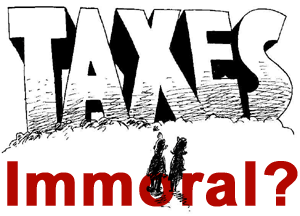 by Fr. Gregory Jensen –
by Fr. Gregory Jensen –
“In this world nothing can be said to be certain, except death and taxes.” ~ Benjamin Franklin
Does the government have a moral right to levy and collect taxes on its citizenry? Or is taxation merely a legalized form of governmental robbery?
While I’ve now and then heard people argue that taxation has no moral basis, I must confess that I find this assertion deeply troubling. As a matter of prudence, not everything which is immoral can, or should, be illegal. There are a variety of reasons for this chief among them is that as a practical matter the enforcement of a law can sometime cause more harm than good.
For example, the worship of God is a moral obligation both in the Scriptures and under at least some theories of natural law (see Romans 1). However as a prudential matter, a law that required people to worship God would invariably lead to social unrest.
we cannot separate law and morality
None of this, however, should be taken to mean that we can separate law and morality. We shouldn’t and we can’t. To do so does not free the society. Rather it binds us evermore to the passing whim of the government and ultimately to the mob whose good will even a tyrant must take into consideration. Law divorced from morality will eventually enslave citizenry. That the people are enslaved to their own desires is ironic but it is no less the case that they are slaves.
So is it true that the government has only a legal and not a moral claim on our income?
I’m not 100% certain of what people mean when they say this. But I would argue that if the government has a legal claim on income it can only rightly advance that claim if there is an underlying moral basis for the law. If there is no moral claim, then the legal is unjust.
No one, under any conditions, has a moral right to take an innocent life.
To take a different example, abortion is legal in the US but the underlying moral claim—that a mother has a right to abort her child—is wrong from both the perspective of biblical morality and natural law. Whether the right to abortion is asserted in absolute or only relative terms doesn’t matter. No one, under any conditions, has a moral right to take an innocent life. Therefore the laws supporting abortion are themselves immoral.
Further, not only Christians but all people of good will have an obligation—at a minimum— not to comply with the law in this matter. Yes, this raises a number of practical questions, but my point here is not to argue the morality and legality of abortion. It is rather to point out that compliance with a law—in this case the tax law—is only morally licit if the law itself is based on a legitimate moral claim.
Neither as a person of good will nor as a Christian can I obey an immoral law.
Neither as a person of good will nor as a Christian can I obey an immoral law. If taxation is merely legal and has no moral foundation (as some might assert) then not only do people have no obligation to pay taxes, they have a positive obligations NOT to pay taxes. Indeed there is a moral obligation not to participate—communally or personally—in the collecting or paying of taxes since to do so is to cooperate with an unjust and immoral law.
I’m not advocating that Christians NOT pay taxes.
It is however to point out that the State has a moral claim on at least some percentage of the income of its citizenry. While in the broad sweep of human history this claim can, and has, been abused by governments, this abuse does not invalidate the underlying moral legitimacy of taxation. That some governments abuse the State’s authority to levy and collect taxes no more invalidates the moral goodness of taxation then adultery invalidates the moral goodness of marriage.
Moral laws foster liberty.
More broadly, absent a firm moral basis government—secular or ecclesiastical—becomes merely the exercise of power for power’s sake. At least in the classical Christian understanding the moral law not only binds my desires, in binding it also directs them to those goals which make possible a deeper personal and communal expression of freedom. Moral laws foster liberty.
Just my thoughts on the matter. Your thoughts are, as always, welcome.
In Christ,
+Fr Gregory
HT: Koinonia




Thanks for posting my essay!
In Christ,
+Fr Gregory